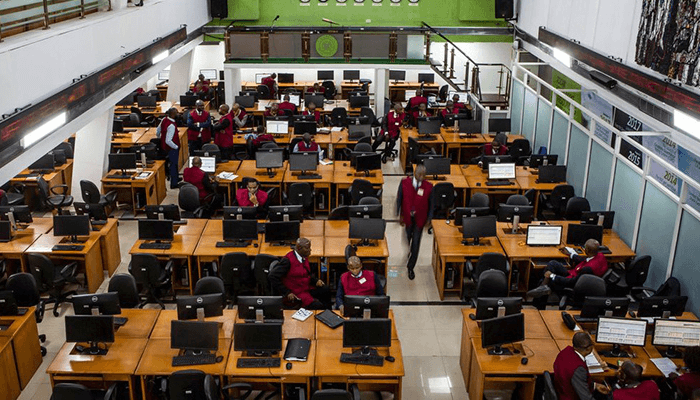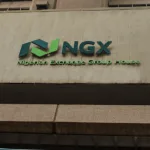The Nigerian Exchange witnessed a loss on Monday, shedding N102 billion in equity market. This downturn was primarily driven by declines in key stocks such as First Bank of Nigeria Holdings, Seplat Energy, and Transcorp.
The All-Share Index dropped by 0.18 per cent, settling at 99,118.86 points, while market capitalisation fell to N56.07 trillion.
Join our WhatsApp ChannelMarket analysts observed a bearish trend throughout the trading day, with 23 stocks declining compared to 17 that gained. This shift follows a bullish performance last week, where investors enjoyed a gain of N954 billion. By the week’s end, the market capitalisation and All-Share Index had increased by 0.02 percent, closing at N56.17 trillion and 99,300 points, respectively.
Among the notable losers on Monday, E-tranzact International led the chart with a 9.82 percent drop, closing at N5.05. Unity Bank followed closely, losing 9.80 percent to end at N1.38, and Jaiz Bank dipped by 9.65 percent, closing at N2.06.
READ ALSO: Nigerian Equity Market Sees Positive Week With N954 billion Gain
“The market sentiment has clearly shifted from last week’s bullish run,” said a market analyst. “Investors are reacting to various economic indicators and the performance of key sectors.”
On the gainers’ side, Cornerstone Insurance Company and Deap Capital Management and Trust both appreciated by 10 percent, closing at N2.09 and N0.44, respectively. Oando also saw a significant gain of 9.75 per cent, ending the day at N12.95.
Despite these gains, the overall year-to-date return for the market decreased slightly to 32.6 percent from the previous 32.8 percent. The volume and value of shares exchanged also saw declines, with the number of units traded dropping by 19.5 percent to 349.6 million and the value falling by 38.9 percent to N5.2 billion.
Four indexes posted losses, one saw gains, and the Oil and Gas index remained flat. The banking index experienced a 0.8 per cent decline due to price drops in FBNH and UBA. The Consumer and Industrial Goods indices each fell by 0.1 per cent, impacted by sales pressure on Nigerian Brewery, WAPCO, and Julius Berger. However, the Insurance index rose by 2.8 percent, thanks to price appreciation in Custodian and Allied and Cornerstone Insurance.
“Today’s performance reflects the mixed reactions across different sectors,” commented another analyst. “While some sectors are experiencing gains, others are under pressure due to various market forces.”
The fluctuations in the Nigerian Exchange highlight the ongoing volatility and the need for investors to stay informed about sector-specific developments. As the market adjusts to new economic data and company performances, stakeholders will continue to watch these trends closely.
In conclusion, the equity market’s decline on Monday underscores the dynamic nature of stock trading, where gains and losses can fluctuate rapidly based on numerous factors. Investors are advised to maintain a diversified portfolio to mitigate risks associated with such market volatility.
Emmanuel Ochayi is a journalist. He is a graduate of the University of Lagos, School of first choice and the nations pride. Emmanuel is keen on exploring writing angles in different areas, including Business, climate change, politics, Education, and others.
- Emmanuel Ochayihttps://www.primebusiness.africa/author/ochayi/
- Emmanuel Ochayihttps://www.primebusiness.africa/author/ochayi/
- Emmanuel Ochayihttps://www.primebusiness.africa/author/ochayi/
- Emmanuel Ochayihttps://www.primebusiness.africa/author/ochayi/



















Follow Us